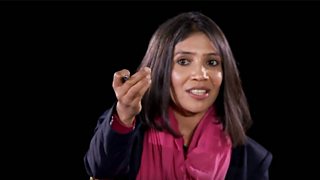
For International Women's Day, Bidhya Chapagain describes her journey from farmer's daughter to presenter for a national debate show in Nepal, Sajha Sawal (Common Questions).
As a farmer’s daughter growing up in a village in Nepal, I used to dream of becoming a journalist and being able to shape my own future. My mother was only 12 when she married and she supported my hopes because she wanted a better life for me. Access to education and information was key - they unlocked doors for me.
Now as the presenter of a TV and radio debate show I have become a role model for many women and girls. I’m giving them information and by seeing me on screen and hearing me on air, I hope I will encourage them to live their dreams.
In one show, we asked police representatives some tough questions about why the families of women injured and even killed by their in-laws found it so hard to secure justice. In another we made television history in Nepal when were able to ask questions of our first female president.
Family support
This year for International Women’s Day we have invited the parents of successful women onto . It is the family – in the first instance - that motivates and encourages women and girls, and supports girls’ education. I hope our programme will encourage the family members to be proud of having a girl in their family.
When I travel around Nepal people stop and share their problems with me – even in the very remote places, they want my help. We can put pressure on those in power – and we can also show the human face of the challenges facing women and girls.
I was on location filming earlier this year when living in a camp for people displaced by the earthquake asked to speak to me privately. She told me that older men had already asked for her hand in marriage but she wanted to stay at school – she didn’t want to get married – not yet. “I want to be educated and help my village,” she told me. Her story and her courage touched thousands of people all over the world, not only those who saw her on Sajha Sawal in Nepal, but those on YouTube, on Facebook, on Twitter. It’s a testimony to the power of the media to connect people from very different worlds.
Read more inspiring stories of how women are using media to make waves.